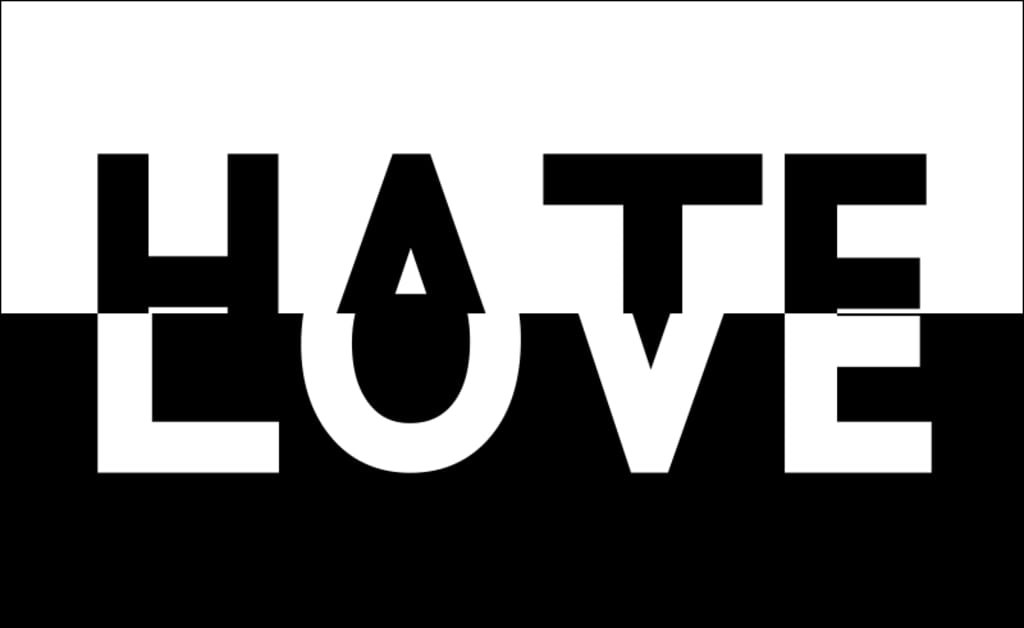
2 of the most used words in the dictionary. Always told to be contradictory but not really. By Brian Salkowski
The connection between love and hate is a complex and fascinating topic that has intrigued psychologists, philosophers, artists and ordinary people for centuries. Love and hate are often considered to be opposite emotions, but they also share some common features. Both are intense, passionate and sometimes irrational feelings that can motivate or destroy human behavior. Both can also fluctuate over time and across different situations and relationships.
One can argue the same amount of passion for love is needed just the same for hate, making them inexplicably forever linked.
One possible way to understand the connection between love and hate is to examine the cognitive, affective and behavioral components of each emotion. Cognitively, love and hate involve positive or negative evaluations of the object of one's feelings, as well as beliefs and expectations about their qualities, actions and future outcomes. Affectively, love and hate involve pleasant or unpleasant sensations, moods and emotions that are associated with the object of one's feelings. Behaviorally, love and hate involve actions or tendencies to act that are aimed at enhancing or harming the object of one's feelings, or oneself in relation to them.
Another possible way to understand the connection between love and hate is to consider the evolutionary, biological and social factors that influence them. Evolutionarily, love and hate may have evolved as adaptive mechanisms to facilitate cooperation or competition, attraction or repulsion, bonding or separation among individuals or groups. Biologically, love and hate may be influenced by hormones, neurotransmitters, brain structures and genetic factors that regulate arousal, reward, attachment and aggression. Socially, love and hate may be shaped by cultural norms, values, beliefs and practices that define what is acceptable or unacceptable, desirable or undesirable, moral or immoral in one's feelings toward others.
The connection between love and hate is not only theoretical but also practical and relevant for everyday life. Understanding the similarities and differences between these two emotions can help us to manage them better, to avoid their negative consequences and to enhance their positive outcomes. It can also help us to appreciate the richness and diversity of human experience, as well as the challenges and opportunities that it presents.
Hat e is a powerful emotion that can damage any relationship. However, it does not have to be permanent or irreversible. By reacting positively to hate, you can overcome it and restore love and trust in your relationship. You can express your feelings constructively, empathize with your partner's perspective, and forgive each other for any mistakes. By doing so, you can transform hate into love and create a stronger and healthier relationship.
Hate is a strong and destructive emotion that can poison any relationship. It can stem from resentment, jealousy, betrayal, insecurity, or misunderstanding. Bringing love and hate to the open is not easy, but it can be beneficial for our mental health and emotional growth. It can also improve the quality of our interactions and connections with others. By being open about our feelings, we can foster more trust, intimacy and harmony in our lives.
Sometimes, we may feel both love and hate for the same person or situation, which can create confusion and conflict. How can we bring these emotions to the open and deal with them in a healthy and constructive way? My mantra has always helped me:
Don't take it personally. Remember that hate and insecurity are more about the person who is expressing them than about you. They may be projecting their own fears, doubts, or frustrations onto you, or they may be trying to make themselves feel better by putting you down. Don't let their negativity affect your self-esteem or your goals. Also...the high road. Looking down at the detractors is not egotism. Its reacrtonary. Don't engage in arguments or fights. Responding to hate and insecurity with anger or defensiveness may only escalate the situation and make things worse.
About the Creator
Brian
I am a writer. I love fiction but also I'm a watcher of the world. I like to put things in perspective not only for myself but for other people. It's the best outlet to express myself. I am a advocate for Hip Hop & Free Speech! #Philly
Enjoyed the story? Support the Creator.
Subscribe for free to receive all their stories in your feed. You could also pledge your support or give them a one-off tip, letting them know you appreciate their work.






Comments
There are no comments for this story
Be the first to respond and start the conversation.